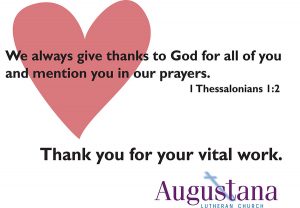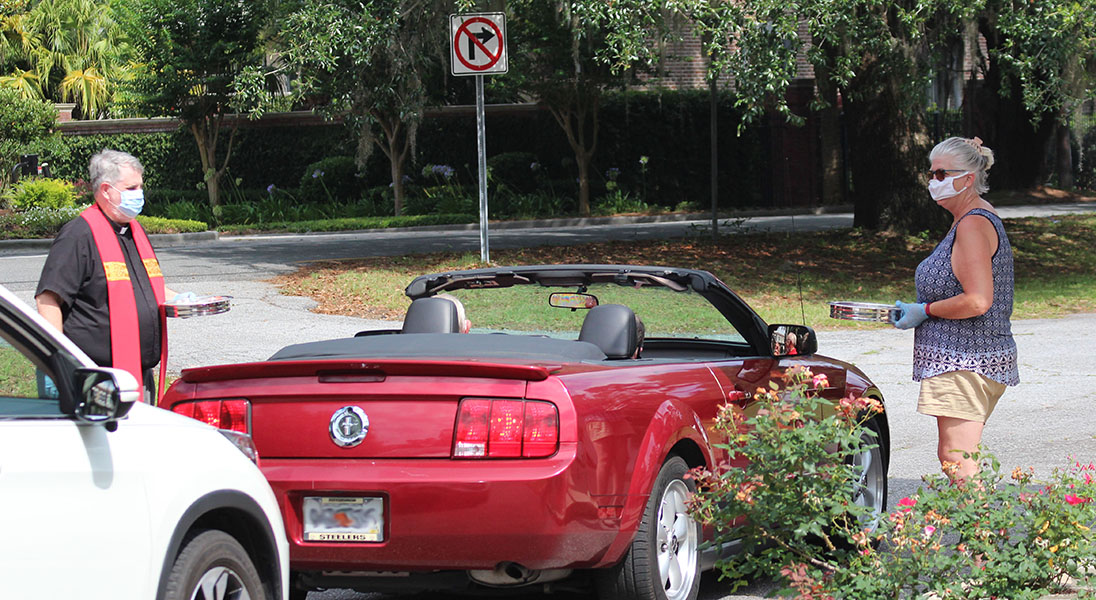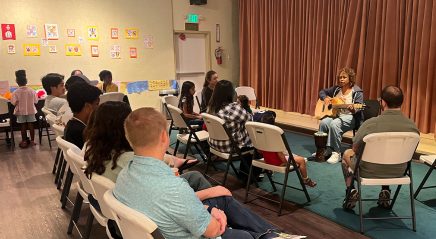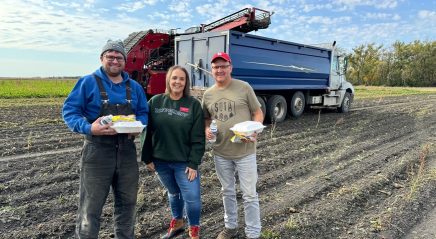Editor’s note: Beginning in March, people across the United States and around the world began to shelter in place due to the COVID-19 pandemic. But this didn’t stop the ministries of our church. Living Lutheran has heard from readers, congregations and synods about the many ways ELCA members and ministries are keeping connected and serving during the pandemic. A few of these efforts are shared here.
Special deliveries
At Lutheran Church of the Redeemer in Savannah, Ga., the first Sunday without in-person worship services became a catalyst for ideas that have carried members from March through June. In addition to recording online services, the Worship and Music and Education committees brainstormed ideas to keep people tied to the ritual of worship in the church year. On Palm Sunday, the committee delivered palm crosses that members displayed and photographed for a social media wave. For Easter, members received seed-paper butterflies. And for Pentecost, origami doves were made and delivered, along with Bible study activities for children.
The congregation’s pastor, Steve Hilgeman, also began offering drive-through communion on May 31, Pentecost Sunday. More than 65 people participated the first week. And on Sundays, the Worship and Music Committee chair hosts a Zoom coffee fellowship from 9:30-10 a.m., so those connected online can share the week’s news (they even have Zoomers from Wisconsin!). For those who aren’t online, council members make weekly telephone calls to see who needs groceries, gabbing or gospel.
The congregation hopes to resume in-person worship services in July.
Vehicles drive ministry
In Lemmon, S.D., members of Calvary Lutheran Church celebrated Pentecost Sunday with a parade. Eight vehicles decorated with red balloons and one bright red pickup with pinwheels and ladybug ornaments attached to the grill drove by the homes of Calvary’s homebound members, who had been contacted with the approximate time of the visit. Each member visited received red carnations along with a printed Pentecost blessing. The parade concluded with a cruise down Main Street on the way back to the church.
In another parade, members of Hope Lutheran Church, St. Petersburg, Fla., celebrated the retirement of Bob Bresemann on his last Sunday as their pastor. The parade included fire engines and many members and their families. Some held signs from car windows and beeped, while others gave Bresemann cards and balloons from a safe distance.
Members of Gethsemane Lutheran Church, Virginia, Minn., held a special drive-through congregational meeting to call Amy Janssen as their new pastor. They received ballots as they entered the church parking lot and placed them in a box as they drove out. Members stayed in their vehicles during the meeting and followed the agenda on their car radios. Questions could be called or texted to council members during the meeting.
Signs of appreciation
Members of the Health Ministry Team at Augustana Lutheran Church, Denver, distributed 48 yard signs to 54 members who continued working during the pandemic, including teachers, mental health therapists, first responders and health care workers. A teacher who was retiring at the end of the school year was particularly touched by the gesture since he was ending his career in a very unusual way—teaching remotely.
 Door hangers accompanied the yard signs (at right) with the following text: Please accept our most sincere thanks for your vital work as a teacher, first responder, mental health or health care worker. This yard sign is a small token of our appreciation for your dedication during these challenging pandemic days. Be confident we include you in our daily thoughts and prayers. Stay well and know that God’s presence is with you each and every day.
Door hangers accompanied the yard signs (at right) with the following text: Please accept our most sincere thanks for your vital work as a teacher, first responder, mental health or health care worker. This yard sign is a small token of our appreciation for your dedication during these challenging pandemic days. Be confident we include you in our daily thoughts and prayers. Stay well and know that God’s presence is with you each and every day.
Blessings and peace be with you,
Your Augustana Faith Community
Signs of remembrance
In Hilton Head Island, S.C., the reports of escalating cases and deaths of COVID-19 moved Ray Makalous, a member of Christ Lutheran Church, to suggest planting a red camellia tree on Pentecost Sunday to remember all those lost to the pandemic. Given the partial quarantine, only a small group gathered at the church for the tree planting and blessing. Following prayers and Scripture, the tree was planted with the help of Carlton Dallas, a community member who had heard what was happening and wanted to be present. After a prayer of blessing, all were invited to take one of the water bottles provided to water the tree and offer their own silent prayers.
The tree is planted near a bike path that runs in front of the church—a regular pathway for locals and the many tourists who visit the island year-round. A small sign will be placed next to the tree so all will know its significance for years to come.
Many churches across the U.S. participated in a day of remembrance on June 1. Mary Miller-Zurell, pastor of St. Timothy Lutheran, Conover, N.C., thought the best way to participate in the remembrance was to ring the church bell, a tradition when someone has died. St. Timothy’s bell rang more than 1,000 times to honor and remember those who had died from COVID-19 in the United States. Miller-Zurell told the Hickory (N.D.) Daily Record that each bell toll represented 100 deaths (on June 1 the number of deaths was 104,396, according to the Centers for Disease Control and Prevention). The bell sounded for nearly 90 minutes.
At press time, the congregation was still meeting for worship outdoors, with everyone staying in their vehicles. “I stand on the back of a pickup truck,” Miller-Zurell told the paper.
Help for pets
While many congregations found innovative ways to keep their food pantries open, Trinity Lutheran, Lawrence, Kan., didn’t forget the needs of our four-legged friends. Volunteers weekly receive donations from pet food companies, pet food stores and individuals so they can stock Trinity’s Pet Food Pantry. Member Susan Hadl helped start the pantry to ensure that people can keep their pets fed even when they are struggling for funds. Before the pandemic, an average of 200 people came each Saturday to the church fellowship hall to pick up a small bag or two of cat food, litter and dog food—already measured out in weekly allocations based on pet size and number of pets in the family. During the pandemic, the Pet Food Pantry continues to serve by meeting folks in the church parking lot, taking orders and bringing out the portioned foods, now in two-week allocations.








